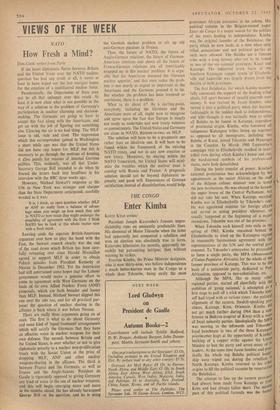VIEWS OF THE WEEK
NATO
How Fresh a Mind?
DON COOK writes from Paris:
If the latest diplomatic flutter between Britain and the United States over the NATO nuclear question has had any result at all, it seems at least to have wiped out the last vestigial hopes for the creation of a multilateral nuclear force.
Paradoxically, the Department of State may not be all that unhappy over this result. At least it is now clear what is not possible in the way of a solution to the problem of Germany's participation in nuclear planning and decision- making, The Germans are going to have to accept this fact along with the Americans, and get on with the job of figuring out something else. .Clearing the air is no bad thing. The MLF issue is old, stale and tired. The impression Which this correspondent gained in Washington a short while ago was that the United States did not have any hopes for MLF but felt it necessary to go through the motions of keeping it alive purely for reasons of internal German politics. This, evidently, was all that Under- Secretary George Ball intended to do when he floated the letters back into headlines in his interview with the BBC three weeks ago.
However, Michael Stewart's response at the UN in New York was stronger and sharper than the State Department anticipated, carefully worded as it was: It is, 1 think, an open question whether MLF or ANF do really have a balance of advan- tage when you weigh up how much they add
• to NATO or how much they might endanger the "possibility 'of agreement with the East. I think , NATO has to look at this whole matter now with• a fresh mind.
Leaving' aside the separate British-American argument over how to play the hand with the East, the Stewart remark clearly was the end of the road down which Britain has been care- fully retreating ever since Harold Macmillan agreed to support MLF in order to obtain Polaris missiles from President Kennedy at Nassau in December 1962. Yet the Americans had still entertained some hopes that the Labour government would make a genuine effort to come to agreement with West Germany on the basis of its own Allied Nuclear Force (ANF) proposals, which are both broader and looser than MLF. Instead, Michael Stewart slipped this one over the side too, and for all practical pur- poses the question of nuclear sharing in the alliance is back where it was before Nassau.
There are really three arguments going on at once. The first is what to do about Germany and some kind of 'equal treatment' arrangements which will satisfy the Germans that they have an effective voice in nuclear weapons for their own defence. The second, between Britain and the United States, is over whether or not to give diplomatic priority to a nuclear non-proliferation treaty with the Soviet Union at the price of dropping MLF, ANF and other nuclear weapons-sharing in the alliance. The third is between France and the Germans, as well as France and the Anglo-Saxons. President de Gaulle is rigorously opposed to giving Germany any kind of voice in the use of nuclear weapons, and this will begin emerging more and more in the months ahead. He has already harangued" George Ball on the question, and he is using the German nuclear problem to stir up old anti-German passions in France.
Thus, the future of NATO, the future of Anglo-German relations, the future of German- American relations and above all the future of Franco-German relations are all inextricably wrapped up in this nuclear problem. It is argu- able that 'the Americans invented the 'German nuclear appetite,' and that even today the prob- lem is not nearly as urgent or important as the Americans and the Germans pretend it to be. But whether the problem has been invented or overblown, there is a problem.
What to do about it? As a starting-point, everybody, including the Germans and the Americans most of all, ought now to recognise and agree upon the fact that Europe is simply not ready to undertake any new treaty ventures or commitments. The United States and Germany are alone in NATO, thirteen-to-two, on MLF.
The solution will have to be a pragmatic one rather than an idealistic one. It will have to be found within the framework of the existing NATO treaty, and not in any new creation or new treaty. Moreover, by staying within the NATO framework, the United States will mini- mise the troubles which the nuclear issue is causing with Russia and France. A pragmatic solution should not be beyond diplomatic in- genuity and good will. Expressions of German satisfaction, instead of dissatisfaction, would help.






























 Previous page
Previous page